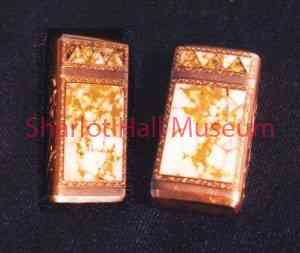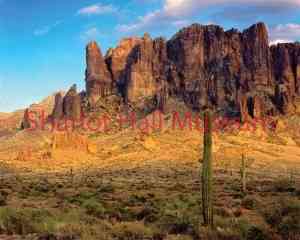By Thomas Glover
Arizona is host to one of the great treasure legends of not just America, but of the world: The Lost Dutchman Mine. The mine is said to have been mined by a German immigrant, Jacob Waltz, who died before he could reveal its location. The mystery is shrouded in history, lore and several “curious” deaths. Ironically, it is also one of the most found lost mines in America.
In the 20 years following Waltz’s death in October of 1891, the possible discovery of the mine was reported multiple times in newspapers from Bisbee to Tombstone to Phoenix. The Mojave County Miner reported in its 1901 October 12 issue:
“The Lost Dutchman mine has again been found. The fact of the finding of the mine for the past twenty years has kept alive the mining industries of the territory. At least a dozen Lost Dutchman mines are found yearly and, strange to relate, many of them turn out to be remarkably good producers. Let the prospector keep on finding the old lost mine and he is made, no matter it is not the original.”
 A short list of people reported as having found it, or to have found an abandoned mine they thought to be the Lost Dutchman Mine, include — in 1900 Joe Mulhatton; in 1901 Charlie Wood and John Chunning (separate discoveries); in 1903 a man chasing his dog found it; in 1906 Henry Young Blood found it: in 1908 a man named Morton and his wife found it; and in 1909 the old prospector Barnscheldt found it. The same year, a Tempe man and his wife (unnamed) found it “a day’s travel from Tempe”. Ongoing discoveries of the Lost Dutchman Mine have continued for well over a hundred years.
A short list of people reported as having found it, or to have found an abandoned mine they thought to be the Lost Dutchman Mine, include — in 1900 Joe Mulhatton; in 1901 Charlie Wood and John Chunning (separate discoveries); in 1903 a man chasing his dog found it; in 1906 Henry Young Blood found it: in 1908 a man named Morton and his wife found it; and in 1909 the old prospector Barnscheldt found it. The same year, a Tempe man and his wife (unnamed) found it “a day’s travel from Tempe”. Ongoing discoveries of the Lost Dutchman Mine have continued for well over a hundred years.
 There have been at least three discoveries of the mine since the 1960s, and in all three cases, good gold was found. One man found it in the Four Peaks and extracted several thousand dollars of ore back when gold was $20 an ounce. At today’s gold price, $1,270/ounce, his gold would be worth over $360,000. Another found it in the Western Superstitions. A group found the Lost Dutchman Mine in the Eastern Superstitions and extracted a considerable amount of rich gold ore.
There have been at least three discoveries of the mine since the 1960s, and in all three cases, good gold was found. One man found it in the Four Peaks and extracted several thousand dollars of ore back when gold was $20 an ounce. At today’s gold price, $1,270/ounce, his gold would be worth over $360,000. Another found it in the Western Superstitions. A group found the Lost Dutchman Mine in the Eastern Superstitions and extracted a considerable amount of rich gold ore.
Mining records show that Jacob Waltz did file claims, two claims with others. The first was the Gross Lode filed in the Walker Mining District. Later, the Turkey Creek Mining District was carved out of the Walker District, and Waltz et al. filed a transfer of claim to the Turkey Creek Mining District. The second was the Big Rebel filed in the Walnut Grove Mining District. Waltz also filed on one mine in just his name, the General Grant, also in the Walnut Grove Mining District. Yet after leaving the Bradshaw Mountains, Waltz never filed a claim again.
The question is, if Jacob Waltz found a rich gold mine, why didn’t he file a claim? If he had, we still wouldn’t know where the mine is, but we would know where it isn’t — a useful piece of information, since the mine has been found multiple times in at least five counties.
The secret or the mystery as to why Waltz never filed another claim after leaving the Bradshaws is the question addressed in the presentation of The Lost Dutchman’s Mine: A Mystery Solved? The answer to the question involves fraud, Indian wars, destruction, claim jumping and death.
Thomas Glover is the author of three books on Jacob Waltz and the Lost Dutchman Mine. This article is a preview of a presentation he will make at the sixteenth Annual Western History Symposium that will be held at the Prescott Centennial Center on August 3rd. The Symposium is co-sponsored by the Sharlot Hall Museum and the Prescott Corral and is open to the public free of charge. For more details, call the Museum at 445-3122 or visit the sponsors’ websites at www.sharlothallmuseum.org and www.prescottcorral.org.
“Days Past” is a collaborative project of the Sharlot Hall Museum and the Prescott Corral of Westerners International (www.prescottcorral.org). This and other Days Past articles are also available at https://sharlothallmuseum.org/articles/days-past-articles.l. The public is encouraged to submit proposed articles and inquiries to dayspast@sharlothallmuseum.org. Please contact SHM Library & Archives reference desk at 928-445-3122 Ext. 2, or via email at archivesrequest@sharlothallmuseum.org for information or assistance with photo requests.


